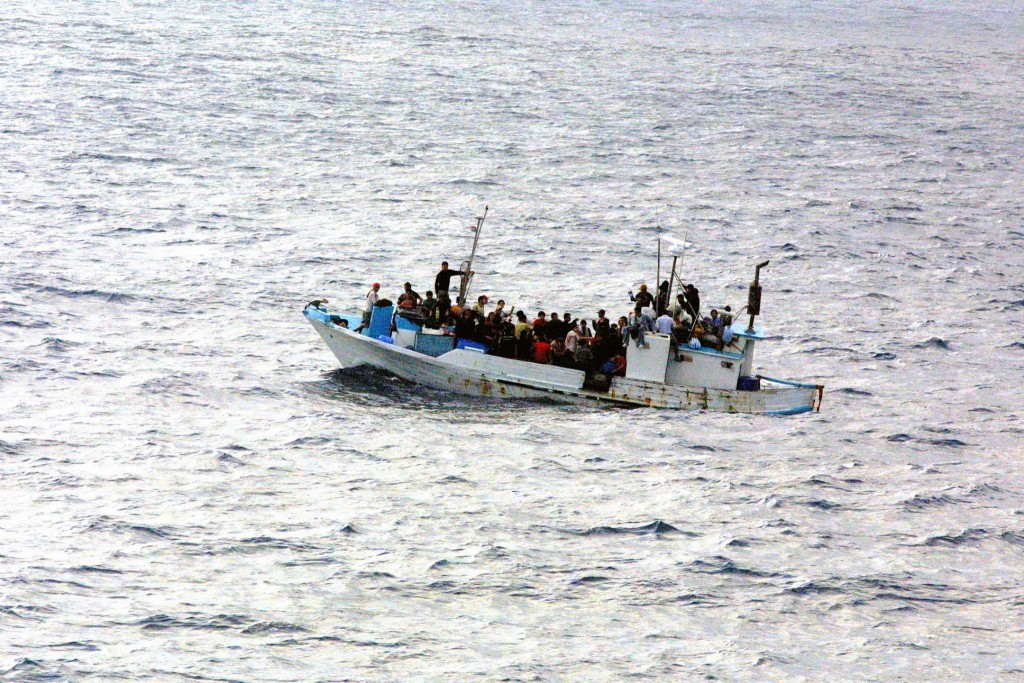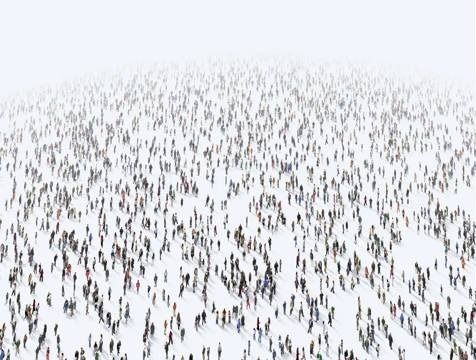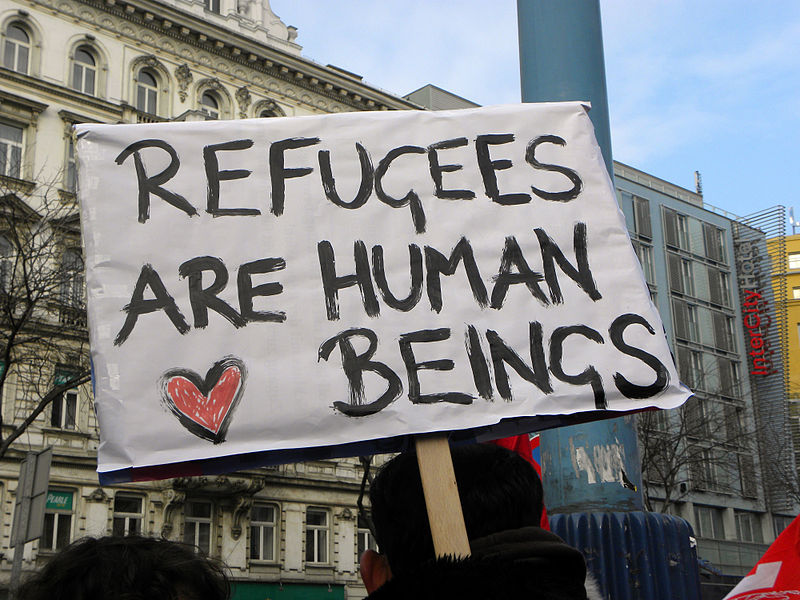I’m not a refugee. I was born in a wealthy northwestern city, in a prosperous land with a stable political system. I grew up in a family who supported me, nourished my interests, and helped me grow. I got a good education, had and have jobs that excite me, fulfill me, and pay more than my bills. I have some reputation for doing work that is useful for others, I have friends who tolerate my weaknesses, I have plenty of opportunities to give time and energy to bigger causes. All in all, I live a comfortable life.
And still, I, too, take refuge all the time. I take refuge to sunglasses when the light is bright; I take refuge to umbrellas, wellies, and raincoats when the skies break and when animals come pouring down. I take refuge to paying taxes, installments for life insurance and pension plans, or subscription fees for online movie services. I take refuge to seeing myself as a member of a peer group or a network, as an alumna of universities and companies, as a citizen of political entities, as a follower of certain beliefs, values, or convictions. And on some rare occasions, when the sunlight is gentle and the rain is just about to stop, I take refuge to being a speck of humanity, uninhibited by adopted identities, fragile, forceful, and flickering like a rainbow.
And then, of course, when it comes to formal practice, there’s always that paragraph towards the beginning of every practice text where it says that I, together with all sentient beings, until enlightenment take refuge with unwavering devotion in Buddha, Dharma, and Sangha. There are days when I hurry over this paragraph quickly and superficially, eager to get to what I see as the “real” core of the practice. There are days when I get stuck on it, because this alone is so vast, so deep, and so ambitiously unachievable that it stops my mind right then and there. And there are days where the beauty of this melts my heart.

So I, too, take refuge all the time.
These days, thousands and thousands of human beings are taking refuge in Europe and all over the world. They’ve left homes and jobs, families and friends, hopes, dreams, and plans for fulfilling futures for themselves and for their children. They’ve trekked across land and water, risking their lives with every step they took. They’ve now landed somewhere where, at least, the immediate physical threats are few—and still, they have no possessions, no legal status, and no reliable perspectives on how tomorrow and the days after tomorrow will unfold.
For me, there can be no hesitation at all: Regardless of personal history, religious or ideological beliefs, and political attitudes, those who can help have to help those who suffer. At the very least, those who have time, money, or useful things they can spare, can give to those who’re in need—the smallest contribution makes a difference, and no one should ever be forced to freeze in a makeshift tent in the middle of what we sometimes like to label “developed” countries. Right now, right here, in Hamburg (just as in many other cities and regions in Germany and in Europe), there are amazing examples of grassroot initiatives gathering and distributing what is needed to those in need.
Beyond the immediate practical help, of course, there are much broader political and economical dimensions to what is happening here. So those who can influence political and economic organizations and institutions have to use their influence with patience, resourcefulness, and wisdom—the smallest intervention can make a big difference, and no one seeking refuge should be exposed to more risks and uncertainties than what they just escaped from. This is going to take time, what is tried and tested is sometimes going to fail, and (as with all things in life) there’s no magical trick that will create reliable realities for all involved. Still, as Samuel Beckett said, we must try again, fail again, fail better—and not blame those who try.
On a very personal level, while contributing my two cents of practical help and aspiring to be of some use in institutional settings, I find myself grappling with the essence of refuge in its ambiguity as, at the same time, a primeval human impulse (to run, either: away from what we fear, or: towards what we want) and a manifestation of the noblest abilities of humanity (to connect with values which transcend the constraints of our ongoing life situations). How so? Here’s what moves around in my head, heart, and guts:
Those who take refuge gave up what they had in terms of material possessions, social networks, and personal and professional plans for an enjoyable future. Of course, there’s fear (of war and terror and all their dire consequences for making a decent, let alone desirable or delightful, living), and there’s hope (of being able to re-build a home, a circle of friends, an adequate workplace, an appealing tomorrow). At the same time, there’s also tremendous courage to step out of a life that was once a comfortable dwelling place, and into a journey that is brimming with dangers, hazards, and uncertainties. As much as I can, I emphasize with the fears and the hopes (acknowledging that I cannot even remotely imagine how it feels to actually experience them). But what sends a shiver down my spine is to see the courage: I bow down to those who leave behind what they had and who they were. I cannot help but feel solidarity with human beings who step out of what they can no longer bear – because I, too, take refuge from time to time.

Those who take refuge turn towards places and times where they expect to find lives worth living, spaces to grow, build, and create, others who support their wishes and endeavors. Yes, there’s desire, the desire of finding the sheltered environment in which to become the promise of the human being whose dreams were shattered by its homeland’s turmoil and turbulence, and there’s jealousy (of others who might have better connections, superior ideas, or just more lucky strikes of being in the right place at the right time with the right people), and there’s also anger, pride, and the rest. At the same time, there’s also deep-rooted confidence of being able to shape our destinies as human beings, regardless of circumstances, and of having the power to surpass any immediate difficulties and perils, sickness, weakness, and death of dreams. As much as I can, I try to understand and respect the desire, jealousy, anger, and pride (helped a lot by the stories my mother told about how she felt as a refugee coming to Western Germany in the 1940s). But what breaks my heart is to see the confidence: I bow down to those who follow their trust in a world that transcends whatever suffering they experienced and still experience. I cannot help but feel concord with human beings who pursue their aspirations – because I, too, take refuge from time to time.
Those who take refuge are left with nothing but their dignity, frailty, and common sense as human beings. Of course, there’s expertise and experience (such as their professional training and knowledge, their personal stories and collective histories, their ability to connect with others, be fellow citizens, friends, or partners in business or in romance, their wit, their humor, and their sarcasm), and there’s needs and wants (such as monetary and material necessities and cravings, personal preferences and animosities, group habits, norms, and tics). At the same time, there’s also fundamental simplicity of being, the acknowledgment that ultimately anything that we thought would define us in our identities is transient, temporary, and not trustworthy. As much as I can, I try to connect with the experience, expertise, needs, and wants (being painfully aware and respectfully in awe of the immense challenge of doing so, on a personal level as well as for our societies). But what makes my mind miss a beat is to see the simplicity: I bow down to those who accept the essence of being just as it is. I cannot help but feel kinship with human beings who face their own nature, because I, too, take refuge from time to time.
For those with an inclination towards Buddhist texts, Patrul Rinpoche cites the Immaculate Sutra as saying: “If all the merit of taking refuge were to take a physical form, the whole of space, entirely filled, would not be enough to contain it”, and Dilgo Khyentse Rinpoche writes: “Refuge is the foundation and starting point. When its meaning is more deeply understood, it is also the ultimate goal, the realization of the Buddha within”. For those with a liking for Bible verses, David is quoted to have said: “The Lord is my rock, and my fortress, and my deliverer; the God of my rock; in him will I trust: he is my shield, and the horn of my salvation, my high tower, and my refuge, my saviour; thou savest me from violence”. For those who enjoy the Qu’ran’s language, the day of resurrection is described as: “At length, when the sight is dazed, and the moon is buried in darkness and the sun and moon are joined together, that Day will Man say: ‘Where is the refuge?’ By no means! No place of safety! Before thy Lord (alone), that Day will be the place of rest”. Or, if none of these is for you, just remember what the 16th century philosopher Michael de Montaigne had inscribed in his personal refuge place, his tower in Dordogne: “À sa liberté, à sa tranquillité et à son loisir”.
May all find refuge.
Photo by
